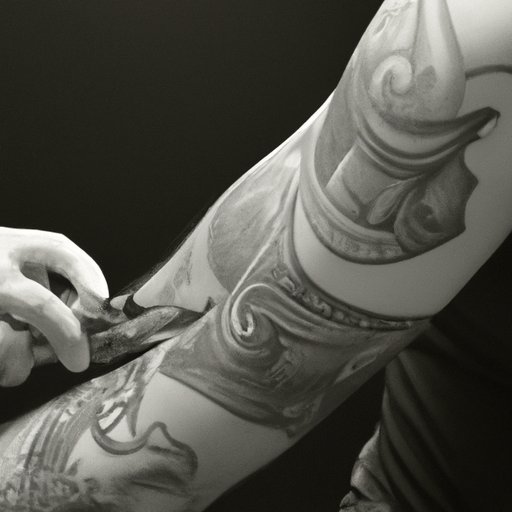Introduction
Tattooing is an art form that has been around for centuries, and it continues to grow in popularity. Aspiring tattoo artists must be creative, have an eye for detail, and be willing to learn and perfect their craft. This guide explains the steps to becoming a tattoo artist, from developing an artistic portfolio to attending workshops and networking with other professionals.

Research and Understand Local Laws and Regulations
Before starting their journey as a tattoo artist, it’s important to become familiar with local laws and regulations. These vary by state and country, so it’s important to research the specific requirements before moving forward. In addition to licensing requirements, there are also health and safety standards that must be met in order to perform tattooing services.
Develop Artistic Portfolio
The next step is to develop an artistic portfolio. This should include a variety of different types of tattoos, including blackwork, colorwork, line work, and lettering. It’s important to showcase your best work in order to attract clients. Your portfolio can be displayed online or in a physical portfolio book.
Practice and Perfect Technique
Once you’ve developed your portfolio, it’s time to practice and perfect your technique. You’ll need to invest in the right tools and materials, such as needles, ink, machines, and stencils. As you practice, focus on creating clean lines and consistent shading. It’s also important to pay attention to the details, such as the size and placement of the tattoo.
Attend Workshops and Seminars
Attending workshops and seminars is another great way to improve your skills as a tattoo artist. There are often events held throughout the year, so it’s important to stay up-to-date on upcoming events. Participating in these events can help you network with other professionals, gain knowledge and insight, and stay current with industry trends.
Network with Other Tattoo Artists
Networking with other tattoo artists is essential for success in the industry. There are several ways to connect with fellow professionals, such as attending conventions, joining local and national associations, and connecting through social media. Building relationships with other tattoo artists can open doors to new opportunities, such as apprenticeships or collaborations.
Find Apprenticeships or Internships
Finding an apprenticeship or internship is a great way to gain experience and hone your skills. When looking for opportunities, it’s important to identify reputable studios or artists who will provide guidance and mentorship. Working with experienced professionals can help you develop your skills, build confidence, and ultimately become a successful tattoo artist.
Conclusion
Becoming a tattoo artist is a rewarding and challenging process. It requires dedication, hard work, and commitment. The steps outlined in this guide can help aspiring tattoo artists get started. Researching local laws and regulations, developing an artistic portfolio, practicing and perfecting technique, attending workshops and seminars, networking with other tattoo artists, and finding apprenticeships or internships are all important steps in the journey.
With dedication and perseverance, it is possible to achieve success as a tattoo artist. Take the time to research and understand the industry, practice and perfect your technique, and make connections with other professionals. With the right attitude and determination, you can turn your dream into a reality.
(Note: Is this article not meeting your expectations? Do you have knowledge or insights to share? Unlock new opportunities and expand your reach by joining our authors team. Click Registration to join us and share your expertise with our readers.)
